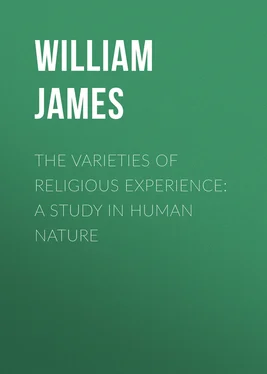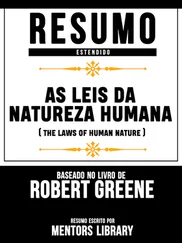William James - The Varieties of Religious Experience - A Study in Human Nature
Здесь есть возможность читать онлайн «William James - The Varieties of Religious Experience - A Study in Human Nature» — ознакомительный отрывок электронной книги совершенно бесплатно, а после прочтения отрывка купить полную версию. В некоторых случаях можно слушать аудио, скачать через торрент в формате fb2 и присутствует краткое содержание. Жанр: foreign_prose, foreign_religion, Философия, foreign_psychology, foreign_antique, на английском языке. Описание произведения, (предисловие) а так же отзывы посетителей доступны на портале библиотеки ЛибКат.
- Название:The Varieties of Religious Experience: A Study in Human Nature
- Автор:
- Жанр:
- Год:неизвестен
- ISBN:нет данных
- Рейтинг книги:4 / 5. Голосов: 1
-
Избранное:Добавить в избранное
- Отзывы:
-
Ваша оценка:
- 80
- 1
- 2
- 3
- 4
- 5
The Varieties of Religious Experience: A Study in Human Nature: краткое содержание, описание и аннотация
Предлагаем к чтению аннотацию, описание, краткое содержание или предисловие (зависит от того, что написал сам автор книги «The Varieties of Religious Experience: A Study in Human Nature»). Если вы не нашли необходимую информацию о книге — напишите в комментариях, мы постараемся отыскать её.
The Varieties of Religious Experience: A Study in Human Nature — читать онлайн ознакомительный отрывок
Ниже представлен текст книги, разбитый по страницам. Система сохранения места последней прочитанной страницы, позволяет с удобством читать онлайн бесплатно книгу «The Varieties of Religious Experience: A Study in Human Nature», без необходимости каждый раз заново искать на чём Вы остановились. Поставьте закладку, и сможете в любой момент перейти на страницу, на которой закончили чтение.
Интервал:
Закладка:
“When I was a monk,” he says, “I thought that I was utterly cast away, if at any time I felt the lust of the flesh: that is to say, if I felt any evil motion, fleshly lust, wrath, hatred, or envy against any brother. I assayed many ways to help to quiet my conscience, but it would not be; for the concupiscence and lust of my flesh did always return, so that I could not rest, but was continually vexed with these thoughts: This or that sin thou hast committed: thou art infected with envy, with impatiency, and such other sins: therefore thou art entered into this holy order in vain, and all thy good works are unprofitable. But if then I had rightly understood these sentences of Paul: ‘The flesh lusteth contrary to the Spirit, and the Spirit contrary to the flesh; and these two are one against another, so that ye cannot do the things that ye would do,’I should not have so miserably tormented myself, but should have thought and said to myself, as now commonly I do, ‘Martin, thou shalt not utterly be without sin, for thou hast flesh; thou shalt therefore feel the battle thereof.’ I remember that Staupitz was wont to say, ‘I have vowed unto God above a thousand times that I would become a better man: but I never performed that which I vowed. Hereafter I will make no such vow: for I have now learned by experience that I am not able to perform it. Unless, therefore, God be favorable and merciful unto me for Christ's sake, I shall not be able, with all my vows and all my good deeds, to stand before him.’ This (of Staupitz's) was not only a true, but also a godly and a holy desperation; and this must they all confess, both with mouth and heart, who will be saved. For the godly trust not to their own righteousness. They look unto Christ their reconciler, who gave his life for their sins. Moreover, they know that the remnant of sin which is in their flesh is not laid to their charge, but freely pardoned. Notwithstanding, in the mean while they fight in spirit against the flesh, lest they should fulfill the lusts thereof; and although they feel the flesh to rage and rebel, and themselves also do fall sometimes into sin through infirmity, yet are they not discouraged, nor think therefore that their state and kind of life, and the works which are done according to their calling, displease God; but they raise up themselves by faith.” 67
One of the heresies for which the Jesuits got that spiritual genius, Molinos, the founder of Quietism, so abominably condemned was his healthy-minded opinion of repentance:—
“When thou fallest into a fault, in what matter soever it be, do not trouble nor afflict thyself for it. For they are effects of our frail Nature, stained by Original Sin. The common enemy will make thee believe, as soon as thou fallest into any fault, that thou walkest in error, and therefore art out of God and his favor, and herewith would he make thee distrust of the divine Grace, telling thee of thy misery, and making a giant of it; and putting it into thy head that every day thy soul grows worse instead of better, whilst it so often repeats these failings. O blessed Soul, open thine eyes; and shut the gate against these diabolical suggestions, knowing thy misery, and trusting in the mercy divine. Would not he be a mere fool who, running at tournament with others, and falling in the best of the career, should lie weeping on the ground and afflicting himself with discourses upon his fall? Man (they would tell him), lose no time, get up and take the course again, for he that rises again quickly and continues his race is as if he had never fallen. If thou seest thyself fallen once and a thousand times, thou oughtest to make use of the remedy which I have given thee, that is, a loving confidence in the divine mercy. These are the weapons with which thou must fight and conquer cowardice and vain thoughts. This is the means thou oughtest to use—not to lose time, not to disturb thyself, and reap no good.” 68
Now in contrast with such healthy-minded views as these, if we treat them as a way of deliberately minimizing evil, stands a radically opposite view, a way of maximizing evil, if you please so to call it, based on the persuasion that the evil aspects of our life are of its very essence, and that the world's meaning most comes home to us when we lay them most to heart. We have now to address ourselves to this more morbid way of looking at the situation. But as I closed our last hour with a general philosophical reflection on the healthy-minded way of taking life, I should like at this point to make another philosophical reflection upon it before turning to that heavier task. You will excuse the brief delay.
If we admit that evil is an essential part of our being and the key to the interpretation of our life, we load ourselves down with a difficulty that has always proved burdensome in philosophies of religion. Theism, whenever it has erected itself into a systematic philosophy of the universe, has shown a reluctance to let God be anything less than All-in-All. In other words, philosophic theism has always shown a tendency to become pantheistic and monistic, and to consider the world as one unit of absolute fact; and this has been at variance with popular or practical theism, which latter has ever been more or less frankly pluralistic, not to say polytheistic, and shown itself perfectly well satisfied with a universe composed of many original principles, provided we be only allowed to believe that the divine principle remains supreme, and that the others are subordinate. In this latter case God is not necessarily responsible for the existence of evil; he would only be responsible if it were not finally overcome. But on the monistic or pantheistic view, evil, like everything else, must have its foundation in God; and the difficulty is to see how this can possibly be the case if God be absolutely good. This difficulty faces us in every form of philosophy in which the world appears as one flawless unit of fact. Such a unit is an Individual , and in it the worst parts must be as essential as the best, must be as necessary to make the individual what he is; since if any part whatever in an individual were to vanish or alter, it would no longer be that individual at all. The philosophy of absolute idealism, so vigorously represented both in Scotland and America to-day, has to struggle with this difficulty quite as much as scholastic theism struggled in its time; and although it would be premature to say that there is no speculative issue whatever from the puzzle, it is perfectly fair to say that there is no clear or easy issue, and that the only obvious escape from paradox here is to cut loose from the monistic assumption altogether, and to allow the world to have existed from its origin in pluralistic form, as an aggregate or collection of higher and lower things and principles, rather than an absolutely unitary fact. For then evil would not need to be essential; it might be, and may always have been, an independent portion that had no rational or absolute right to live with the rest, and which we might conceivably hope to see got rid of at last.
Now the gospel of healthy-mindedness, as we have described it, casts its vote distinctly for this pluralistic view. Whereas the monistic philosopher finds himself more or less bound to say, as Hegel said, that everything actual is rational, and that evil, as an element dialectically required, must be pinned in and kept and consecrated and have a function awarded to it in the final system of truth, healthy-mindedness refuses to say anything of the sort. 69Evil, it says, is emphatically irrational, and not to be pinned in, or preserved, or consecrated in any final system of truth. It is a pure abomination to the Lord, an alien unreality, a waste element, to be sloughed off and negated, and the very memory of it, if possible, wiped out and forgotten. The ideal, so far from being co-extensive with the whole actual, is a mere extract from the actual, marked by its deliverance from all contact with this diseased, inferior, and excrementitious stuff.
Читать дальшеИнтервал:
Закладка:
Похожие книги на «The Varieties of Religious Experience: A Study in Human Nature»
Представляем Вашему вниманию похожие книги на «The Varieties of Religious Experience: A Study in Human Nature» списком для выбора. Мы отобрали схожую по названию и смыслу литературу в надежде предоставить читателям больше вариантов отыскать новые, интересные, ещё непрочитанные произведения.
Обсуждение, отзывы о книге «The Varieties of Religious Experience: A Study in Human Nature» и просто собственные мнения читателей. Оставьте ваши комментарии, напишите, что Вы думаете о произведении, его смысле или главных героях. Укажите что конкретно понравилось, а что нет, и почему Вы так считаете.












